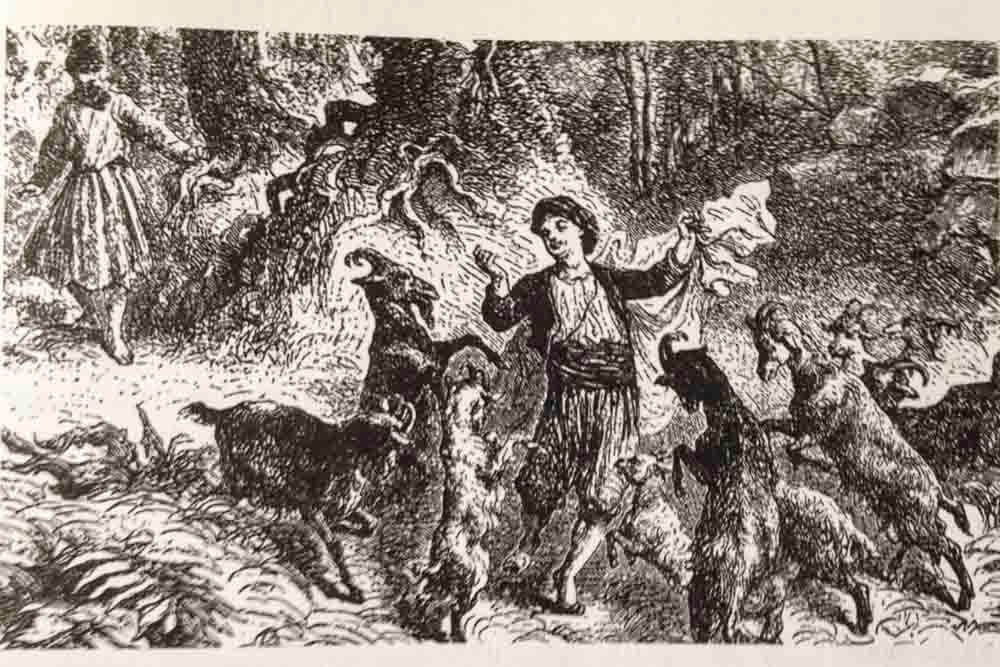Coffee, Caffeine and Culture from a Coffee Connoisseur
Graphic by Agnes Lee.
Ethiopian legend tells of a goat herder Kaldi whose goats became so energetic and active after eating the berries of a certain tree that they refused to sleep at night Kaldi told the abbot at the local monastery about his discovery, and the abbot made a drink from these berries that kept him awake during long evening prayers. He shared this knowledge with other monasteries and the legend of this energy berry spread.
Kaldi and his “dancing goats.” Photo courtesy of Green Farm Coffee
I never thought I would be grateful to a goat-herder for discovering my favorite beverage, but as I take sips from my cup of coffee while writing this article, I am filled with thanks for Kaldi and coffee beans.
Coffee cultivation, development and trade started to grow in the fifteenth century in the Arabian Peninsula. Then, the bean and drink spread to Europe and eventually North America.
Espresso, Americano, Cappuccino, Frappuccino or Drip: all coffee comes from coffee beans! Photo courtesy of The Daily Meal
Today, we are reminded of coffee’s cultural significance every morning when we use our coffee pot or Keurig machine. The beverage offers the positive side effects of community and connection, but it also comes with an unhealthy expectation of productivity.
“Going to a coffee shop and forcing yourself to work is a different level of productivity than you could ever reach at your house,” says Sam Lebeck, a Northwestern sophomore and Starbucks barista. Though she has always been a coffee fan, she never fully realized how the beverage ties people together until she started working at the largest coffee company in the world.
Starbucks employees do have access to free drinks, something Lebeck is definitely grateful for. Photo courtesy of Time Magazine
“The act of getting coffee is a part of the day in and of itself. In all of the training videos they show us, everything comes down to making connections over coffee. How to keep people coming back, how to make your Starbucks more friendly,” says Lebeck. “It’s insane that this one beverage is the impetus of all different social interactions.”
When you’re going on a first date, you haven’t seen a friend for a while, your parents are in town or you have a meeting with a potential client, you most likely suggest grabbing coffee. For college students, though, coffee is also associated with a non-stop grind culture.
Through an anonymous poll via Instagram, Northwestern Wildcats shared their favorite coffee establishments in Evanston. Coffee Lab was the most popular answer, but Newport, Pâtisserie Coralie, Colectivo and Philz all made the list. For a town of only 74,000 residents, there are quite a few coffee shops to choose from.
Artist and writer Flash Rosenberg says, “I believe humans get a lot done, not because we’re smart, but because we have thumbs so we can make coffee.”
Sophomore Hannah Cole’s caffeine habits corroborate this. She brings a cup of coffee with her any time she plans on going to the library or needs to be productive.
“If I am in my room and need to get work done, I’ll immediately think to make coffee,” Cole says. “I study in Deering a lot, and having coffee always helps me feel more productive.”
In this way, drinking too much coffee can reflect an overworked society. As Northwestern students struggle to keep up with the quarter system’s fast pace while juggling extracurricular activities, coffee (and other caffeinated drinks) provide needed energy to get through the day. Jill Rhodaberger-Foldes, a registered dietitian in the Chicago, warns about the consequences of too much caffeine consumption.
How much coffee is too much? Maybe this stock-image man needs to know the answer. Photo courtesy of Drinks Without Borders
“More than two to three cups can really affect your sleep and your anxiety levels,” Rhodaberger-Foldes says. “You also have to ask yourself why you are having coffee: is it to replace a meal? To fight off extreme fatigue? For pure enjoyment? To curb hunger? The reason is really what makes the difference.”
Sophomore Natalie Norquist noticed that she sometimes has bad physical reactions to coffee. “Too much coffee can lead to too much acid in your stomach,” Norquist says. “My chest was super tight and it was difficult to breathe because of the coffee’s acidity.”
Though it has negative consequences when consumed in excess, coffee has health benefits when consumed in moderation. According to Hopkins Medicine, recent studies found that coffee drinkers are less likely to be diagnosed with or die from coronary heart disease, stroke, Parkinson’s disease, Alzheimer's, colon cancer, strokes, diabetes and kidney disease.
Excessive consumption of coffee can be maladaptive, especially to college students who are running on minimal hours of sleep, but the drink also connects us with one another. My dad and I bond over preparing different coffee roasts each morning.My friends and I go to Starbucks and tell silly stories as we drink our cappuccinos. I make a piping cup of black coffee before I write in my journal every day.
With that, I will raise my Disney coffee mug and get another pot brewing.





